Parisian Walkways: Rue Oberkampf in the 11th Arrondissement
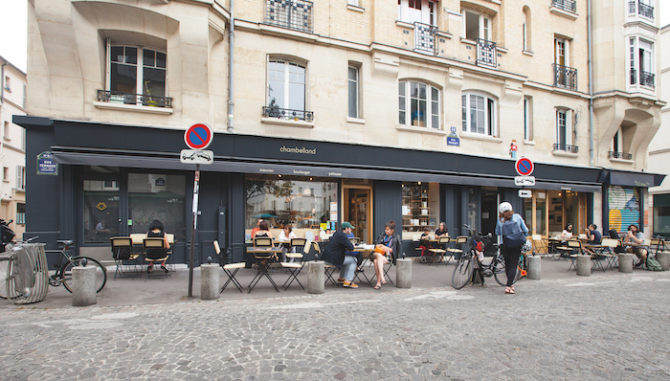
Considered a case study for gentrification, this gourmet street in Paris’s 11th arrondissement is putting customers at the top of the menu. Jeffrey T Iverson samples the atmosphere…
Oberkampf is just the name of another street in the French capital, and yet today it’s synonymous with Parisian nightlife, hip restaurants, chic boutiques, and in a deeper sense, transformation. For if today this vibrant axis of the 11th arrondissement is the place to be, historically it was the place in between – a rue-faubourg, or suburban highway, linking Paris to the formerly independent commune of Belleville. In fact, the Oberkampf neighbourhood has been a favourite case study for scholars researching the process of gentrification. To peruse journal articles with titles like “From the Rue-Faubourg to the Rue ‘Trendy’: Oberkampf and the Centralisation of Leisure in Paris” or “Gentrification and Retail Dynamics in Brussels and Paris”, it’s clear that Oberkampf’s evolution has fascinated academics – and no wonder. As one 2006 study in the Belgian Journal of Geography put it, gentrification is playing out on Rue Oberkampf in ways “far more complex than a process of ‘old’ retail forms being displaced by new ‘trendy’ ones.” Indeed, today on Rue Oberkampf, some of the most traditional professions of all – baker, butcher, cheesemonger, wine merchant – are not being displaced, but are growing in number, and evolving in the most surprising ways.
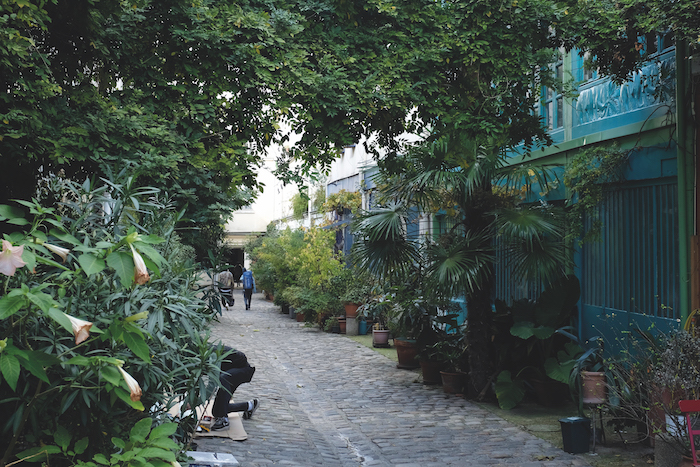
The leafy Cité du Figuier. Photo credit © Jeffrey T Iverson
With creativity and an avant-garde sensibility, a new generation of artisans and entrepreneurs is leading a renaissance of traditional food professions on Rue Oberkampf. “If traditional businesses don’t modernise to offer something that is new or qualitatively different, people will just go to the supermarket,” says Nicolas Merlen, manager of the neighbourhood’s new hybrid fish shop and delicatessen, La Belle Mer.
“Many streets in Paris have seen their traditional food businesses swallowed up by clothing chains and shoe shops,” says Francis Berger of the next-generation butcher shop Boucheries Francis. “Yet today on Rue Oberkampf the number of gastronomic addresses keeps growing. Between Boulevard Richard-Lenoir and Parmentier alone, you have multiple bakeries, pastry shops, butchers, cheesemongers, greengrocers, wine merchants… it’s a street for epicureans!”
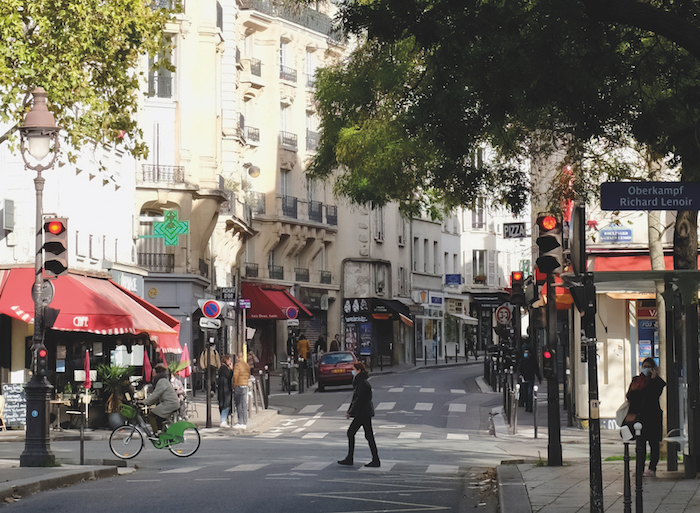
Rue Oberkampf has become a destination for foodies. Photo credit © Jeffrey T Iverson
If Rue Oberkampf is now a destination, for centuries it was mostly a means of getting somewhere else. For more than 300 years it was known as the chemin de Ménilmontant – the way to Ménilmontant, stretching from the Temple quartier in Paris up to this hilltop village. It was only after Ménilmontant and neighbouring Belleville became part of the capital in 1859 that the street got its own name, christened in 1864 after Christophe-Philippe Oberkampf, the 18th-century industrialist whose cotton printing factory in Jouy-en-Josas invented the fabric toile de Jouy. By the 19th century, the street had become industrious indeed, teeming with shops and packed with metal and leather workers.
Today, to step off the Ménilmontant métro onto Boulevard de Belleville and turn down Rue Oberkampf, one soon discovers the vestiges of this industrious past. At nº 154 an opening in a building draws the curious into a cobblestoned passageway leading into la cité Durmar. Originally a lane lined with market gardeners, over time, the little houses the farmers built next to their plots became workshops for craftspeople. A few steps down at nº 104-106 is another remarkably well preserved passageway – cité du Figuier, with its stone culvert running down the middle and its 19th-century buildings where workers lived and worked. Many doubtless spent wild evenings during the Belle Époque just across the street from here at the Café Charbon (nº 109). Founded in 1863, this magnificent café still boasts its original décor with mosaic floors, zinc bar, and wall paintings.
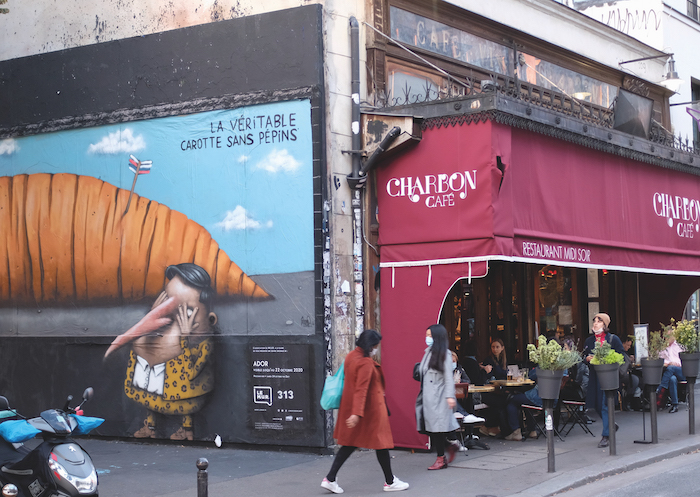
Café Charbon. Photo credit © Jeffrey T Iverson
Rue Oberkampf stretches more than a kilometre from Boulevard des Filles du Calvaire up to Boulevard de Belleville, but it was here, just north of Rue Saint-Maur, that its transformation into one of the city’s trendiest streets began in the 1990s. Artists, architects and other creative types began moving into abandoned ateliers and rehabilitating historic sites like La Cité du Figuier. Café Charbon became the locus of Oberkampf’s nightlife once again, drawing revellers from across the city. The southern wall of Café Charbon, overlooking the verdant café patio of La Place Verte (nº 105), was soon appropriated by two French street art pioneers for a project dubbed Le M.U.R., where new artists continue to paint fresh murals every month.
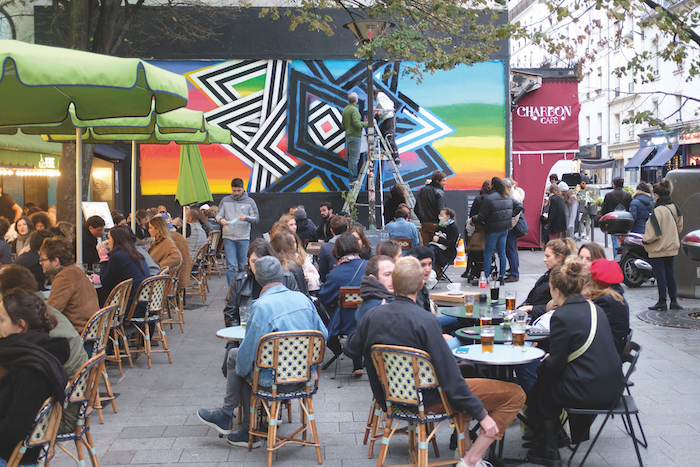
Street art at Le M.U.R. Photo credit © Jeffrey T Iverson
In 1992, restaurateur Michel Picquart and chef Olivier Gaslain opened Le Villaret at 13 rue Ternaux, a quiet street parallel to Rue Oberkampf, transforming Oberkampf into a foodie destination as well.
Simultaneously, across the city, the chef Yves Camdeborde acquired La Régalade in the 14th. Soon, these two restaurants would be credited with inventing a new kind of dining experience. “At that time, there were either Michelin-starred gastronomic restaurants, or the ubiquitous brasserie, but between the two there wasn’t much,” recalls Gaslain. “So we filled that void with bistronomie,” – a contraction of bistrot and gastronomie. They inspired a wave of small restaurants offering cuisine using ingredients worthy of three-star tables yet at affordable prices. After Picquart retired in 1995, Le Villaret continued to flourish with Gaslain as owner. So to what does he credit his success? His 15,000-bottle wine cellar? His famous blanquette de veau?
“Bistronomie is about more than food, it also connotes a kind of conviviality, a bit like the bouchons of old in Lyon – when the restaurant fills up there’s a unique ambiance that permeates the room that people never seem to get enough of.”
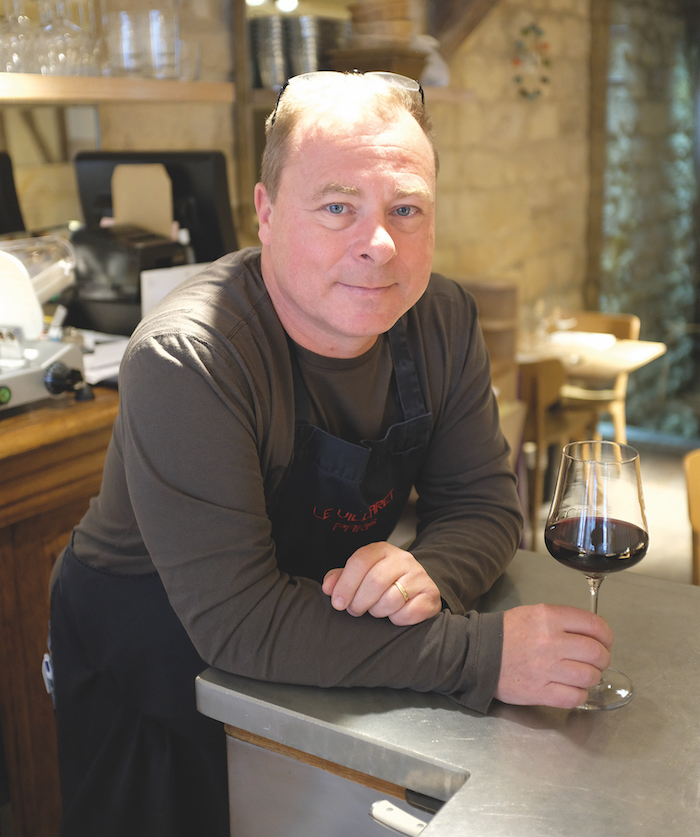
Olivier Gaslain, chef at Le Villaret. Photo credit © Jeffrey T Iverson
A Mecca for Gourmets
Twenty-nine years later, Le Villaret is no longer Oberkampf’s only draw for gourmets. “The neighbourhood has changed a lot,” Gaslain says. “When we first opened it was working class here, whereas today people with greater means have moved in, and it’s become quite bobo. Now Oberkampf is a real gastronomic destination, with many high-quality food addresses, from the restaurants of Pierre Sang (a Top-Chef finalist who opened Pierre Sang in Oberkampf in 2012) to Chambelland, which in just a few years has become the reference for gluten-free bread in France.
“It’s true that around Rue Oberkampf today you see shops being created by people who really believe in what they’re doing,” says wine merchant Cyril Bordarier. “They’re not about passing fads, they’re people who have discovered their source of oxygen, the thing they need to live, and businesses like that are the ones that last.” Cyril should know. When he first opened his wine shop dedicated to additive-free, natural wines, Le Verre Volé at 38 rue Oberkampf 19 years ago, “Paris wasn’t ready for natural wine!” he laughs. “I had to weather quite a few critics and controversies in those first years, but I really believed in it. And today it’s truly become part of the zeitgeist – we’re seeing natural wine everywhere today!”
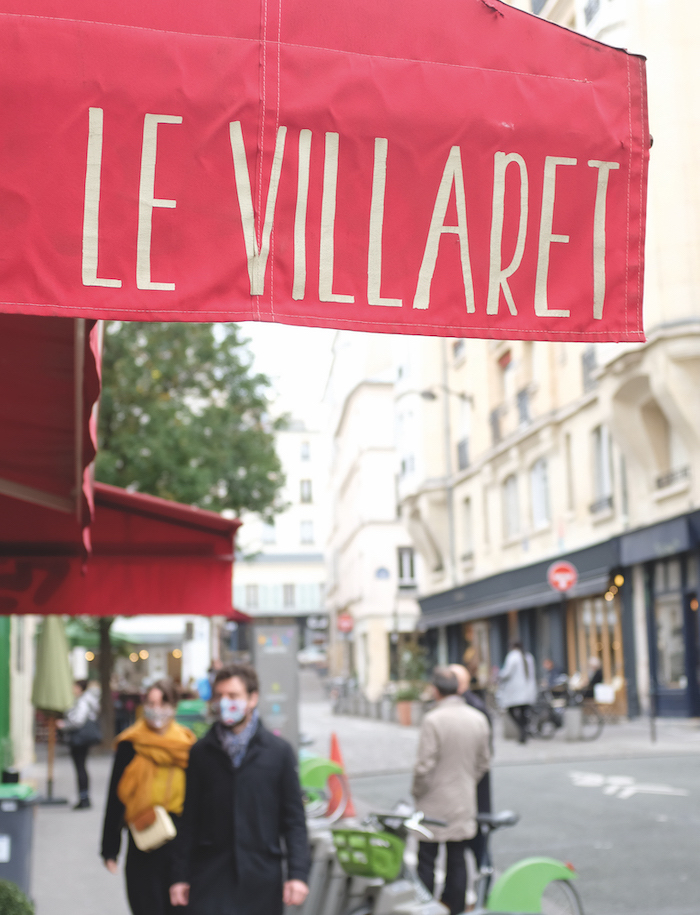
Le Villaret, where a new style of French cuisine was invented. Photo credit © Jeffrey T Iverson
Selling a new vision of something sacrosanct to French culture is a challenge the folks at Chambelland can appreciate. “Our goal was to reinvent the traditional French bakery, without making it seem like something strange to people,” says Pénélope Balaÿ, coordinator for the gluten-free bread and pastry shop, which opened in 2014 just up the street from Le Villaret at 14 rue Ternaux. “Many French can’t fathom bread coming in any form other than a baguette! The thing is, gluten-free bread has existed since the dawn of time, from corn bread in South America to chestnut bread in Corsica. So our desire was to renew, to modernise bread, while remaining anchored in tradition. We want to be a bakery for the neighbourhood, not just for people who are allergic to gluten.” Clearly they’ve succeeded. Today the Chambelland patio, located on a quiet plaza facing Rue Oberkampf, is a favourite spot for locals to relax over coffee and a piece of Chambelland’s luscious lemon meringue pie or orange-blossom sugar bread.
The old axiom ‘know your customers’ may be a cliché, but in Oberkampf entrepreneurs are transforming their businesses to meet the needs of an evolving clientele. Take La Belle Mer on the corner of rue Jacquard and Oberkampf, which has revolutionised the traditional fish shop by offering not only fresh, sustainably-sourced seafood but also a to-go menu of prepared dishes, from lobster rolls to moules-frites.
“It’s what was needed in a neighbourhood like this, a little village full of connoisseurs of high quality products,” says the manager Nicolas Merlen. “People will choose to come to small shops if we have something special to offer, and if they know they’re helping to support more sustainable, ethical ways of farming and distribution.”
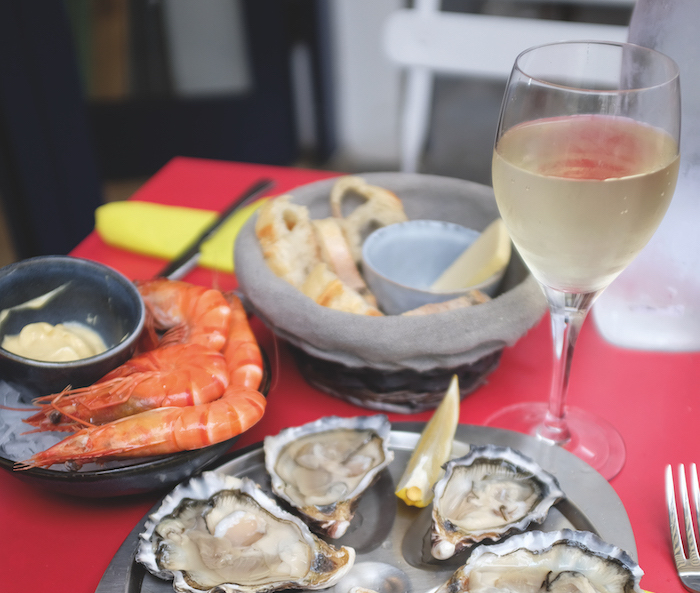
Seafood lunch on the Outdoor Terrace. Photo credit © La Belle Mer
Neighbourly People
That sentiment is shared by Marion Bonnin, manager of l’Arbre à Café, importer of grand cru, biodynamically farmed coffees, which opened a boutique in 2019 at 61 rue Oberkampf. “There is a movement taking place in this neighbourhood. You see it at the fish shop La Belle Mer, at the butcher La Belle Bête (nº59), or the bakery French Bastards (nº61) – these businesses are working to sustain neighbourhood life, and allow residents to do all their shopping in shops that stand for both quality and eco-responsibility.”
Today, that privilege – to be able to walk down one’s street and step into shops full of divine things to eat, where friendly shopkeepers share the stories of their producers – has been all the more appreciated during the trying Covid lockdowns. Francis Berger opened his butcher shop Boucheries Francis at nº 82 in 2017, offering exquisite cuts of heritage breed pork, lamb and beef, all individually preserved in vacuum-packs. But during the lockdowns, it’s been his conversation as much as his Wagyu that’s bringing in customers.
“I’m rather gregarious by nature, and I’ve ended up being both butcher and psychologist in these times. For many people, doing their shopping has been their only chance to get out, breathe a little fresh air, and speak to another human being. I’m very happy to be able to do that for people. I think we have a social role to play as neighbourhood shopkeepers.”
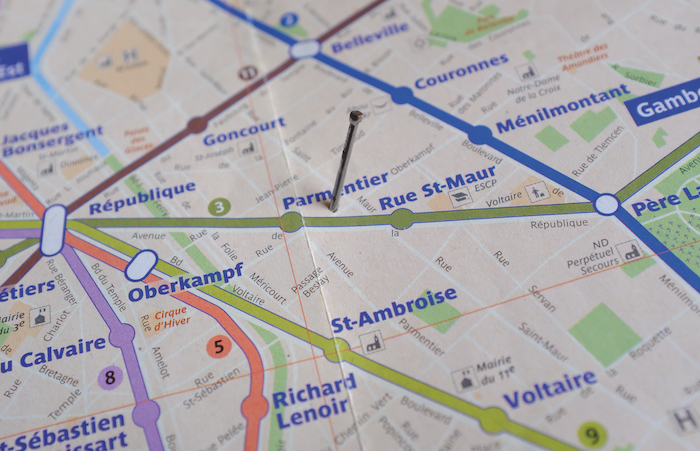
Rue Oberkampf is in Paris’s 11th. Photo credit © Jeffrey T Iverson
One might not expect to hear such sentiments in a neighbourhood used as a case study for gentrification. Yet stroll down Rue Oberkampf today, and you’ll hear them in both new shops and old. Take Chez l’Auvergnat, a cheese shop founded a half century ago at 60 rue Oberkampf. In 2019, owner François Huet passed the torch after 13 years to his son Alexandre. “When I took over, the shop’s décor hadn’t changed for decades, and I felt it needed to be modernised. So I decided to transform it, inside and out.”
The older clientele was initially worried by the plans. But today, when you look beyond Alexandre’s sliding glass door, the chic wood interior and modern lighting, what one sees are the same perfectly ripened cheeses, and the same passion for sharing them. It seems that some things never change – even on Rue Oberkampf.
Boutiques, Galleries & Restaurants
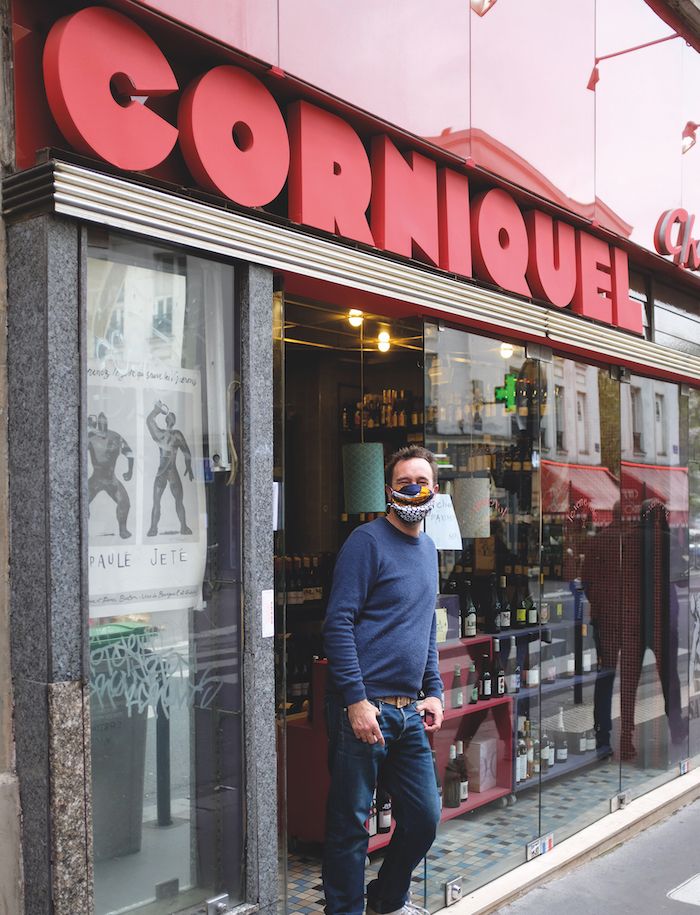
Photo credit © Jeffrey T Iverson
LA CAVE VERRE VOLÉ: 38 rue Oberkampf
Tel. +33 1 43 14 99 46
Twenty years ago, Cyril Bordarier opened a wine shop-bistro hybrid (dubbed a cave à manger) on the Canal Saint-Martin which would become a mecca for a new wine movement – vin naturel, signifying a natural, chemical-free approach to winemaking. Soon after, he opened this boutique on rue Oberkampf in a former charcuterie shop, which today stocks one of the finest collections of natural wines in France.
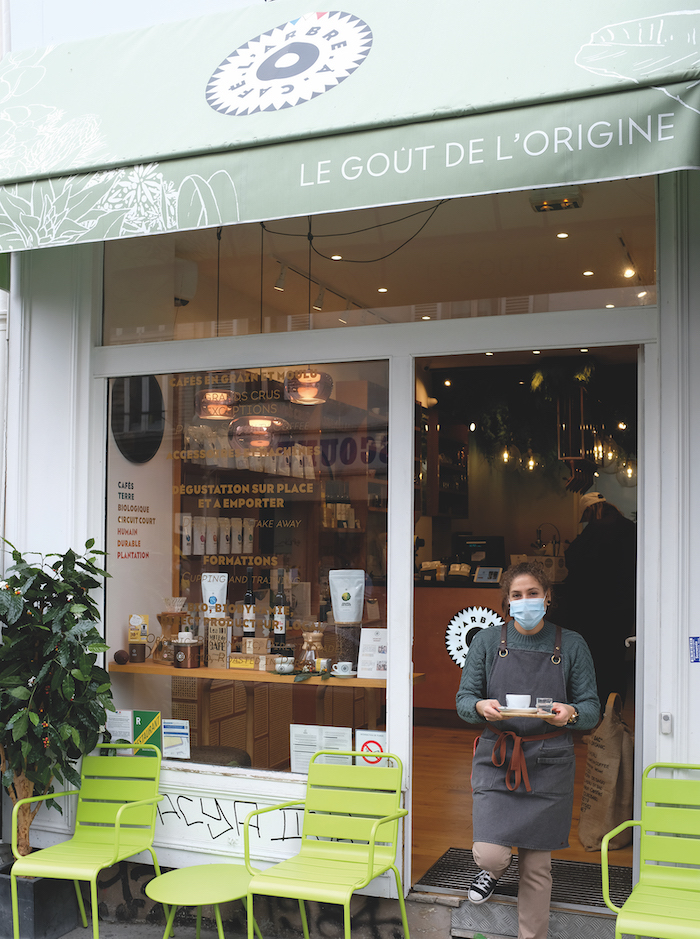
Photo credit © Jeffrey T Iverson
L’ARBRE À CAFÉ: 61 rue Oberkampf
Tel. +33 1 88 33 91 81
Java lovers come here to discover the company that introduced the idea of grand cru coffee to French gastronomy. With an approach to coffee inspired by wine, founder Hippolyte Courty imports single estate, biodynamically grown, single variety coffees, fermented and roasted with precision to unveil maximum complexity, and to create an espresso unlike anything served at your average corner brasserie.
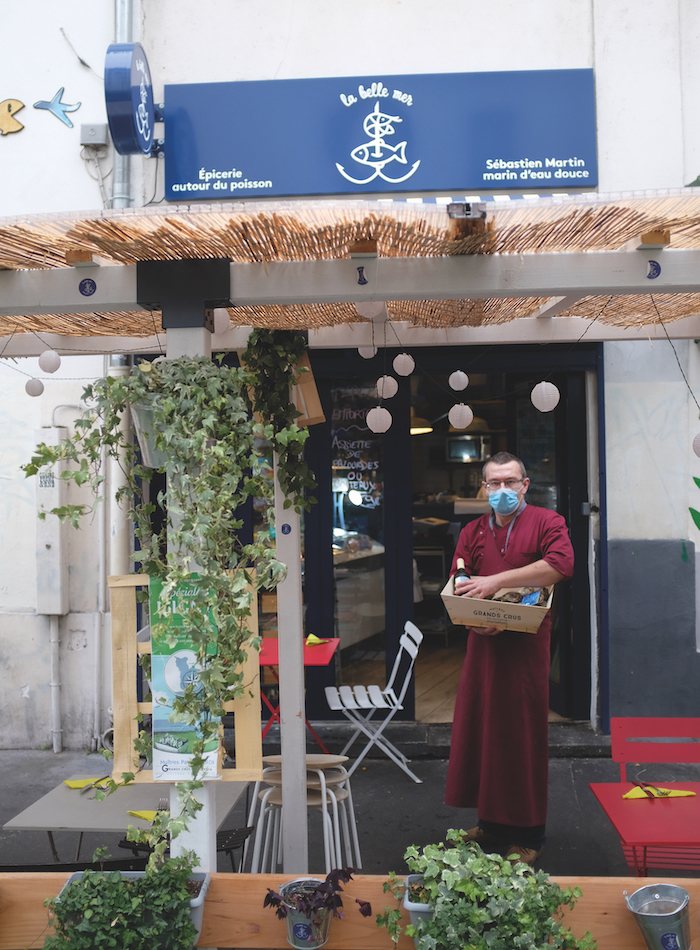
Photo credit © Jeffrey T Iverson
LA BELLE MER: 2 rue Jacquard
Tel. +33 1 47 00 69 75
At a time when many fishmongers are closing, La Belle Mer offers a new version of an age-old profession. This small shop boasts a choice selection of very fresh fish and shellfish sourced four times a week from small, eco-minded fishermen and producers. Plus, they’ll even cook it for you on site to enjoy on their al fresco patio or to-go, be it a sole meunière, fish and chips, mussels or ceviche.
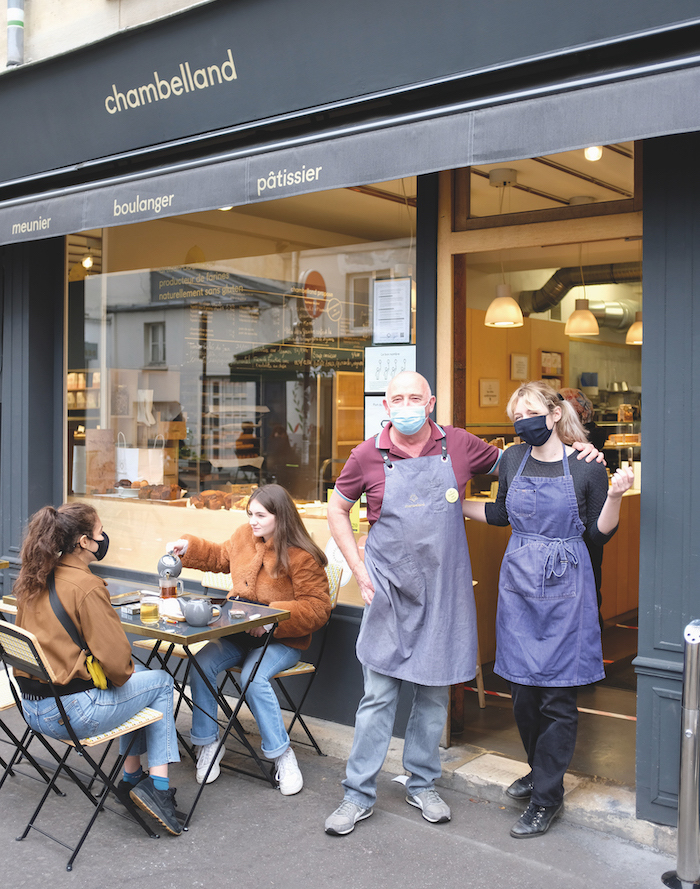
Photo credit © Jeffrey T Iverson
CHAMBELLAND: 14 rue Ternaux
Tel. +33 1 43 55 07 30
In a country where baguettes and pastries are sacrosanct, Chambelland is a bakery which proves that gluten-free doesn’t have to mean pleasure-free. Their delicious breads made from rice and buckwheat flours have been embraced by chefs such as Alain Ducasse. Their brioche-like pains au sucre, lemon meringue pies and quiches are loved by gourmets regardless of their tolerance for gluten.
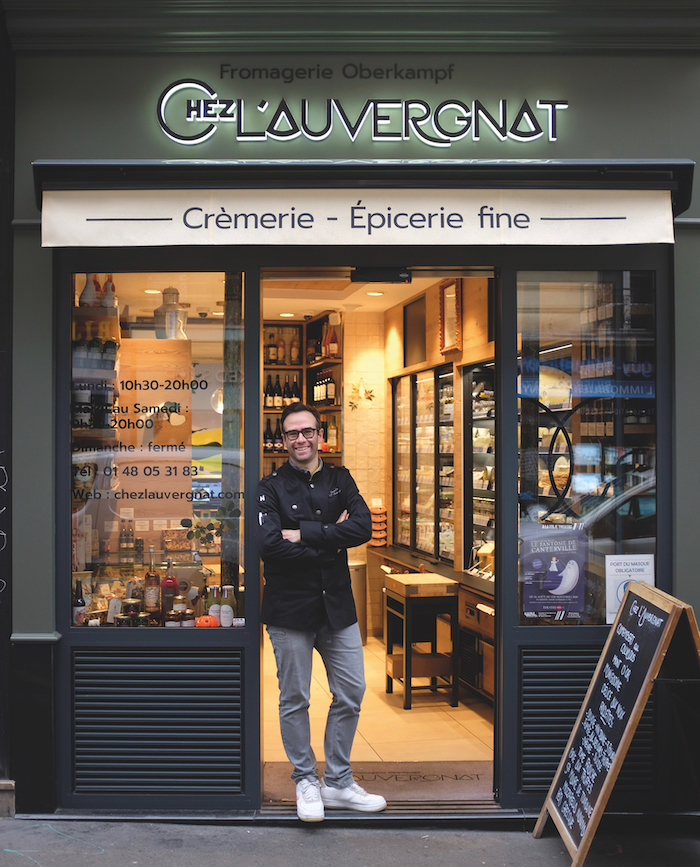
Photo credit © Jeffrey T Iverson
CHEZ L’AUVERGNAT: 60 rue Oberkampf
Tel. +33 1 48 05 31 83
Behind this cheese shop’s modern, streamlined design is a second-generation fromager passionate about artisan, raw milk cheeses and French gastronomy. His elegantly presented array of perfectly ripened cheeses represents the finest creations of the most respected artisan cheesemakers from every region in France, and his wines, charcuterie and prepared dishes celebrate the best of French terroirs.
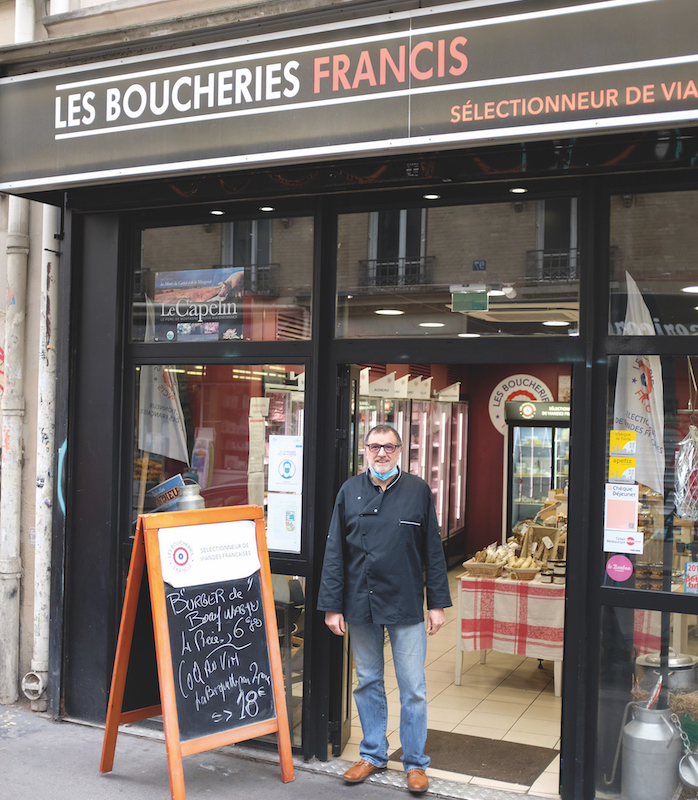
Photo credit © Jeffrey T Iverson
BOUCHERIES FRANCIS: 82 rue Oberkampf
Tel. +33 6 99 40 38 61
Boucheries Francis brings modern packaging to noble French traditions – it’s the butcher’s shop of a brighter future, when consumers will only buy meat from farms that raise heritage breed chickens, cattle and pigs in the most respectful conditions. Here, believers of the motto ‘eat less but better’ come for heritage-breed poultry and pork, and vacuum-packed steaks of the fi nest French-raised Wagyu.
Read the other articles in the Parisian Walkway series here.
From France Today magazine
Share to: Facebook Twitter LinkedIn Email
Leave a reply
Your email address will not be published. Required fields are marked *

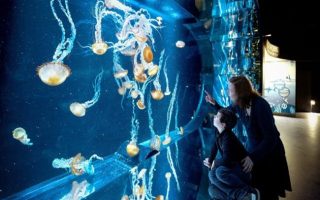
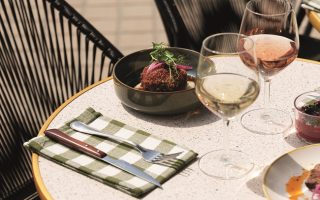

REPLY